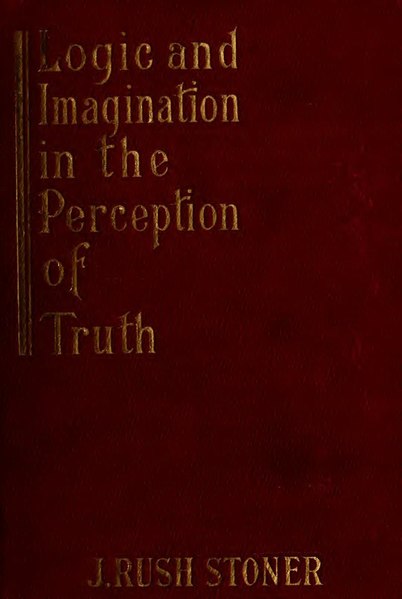Writers sometimes worry about overthinking their writing. They should be more worried about under-imagining it.
A writing friend recently recommended K.M. Weiland’s article, 7 Steps to Stop Overthinking Your Writing. That overthinking is what holds writers back is an appealing thesis, and any article that offers X steps to Y is always good clickbait. Less thinking, more doing, in seven easy steps. But writing isn’t easy. There is a reason many are called but few are chosen. This stuff is hard.
And I don’t think the problem is overthinking. Not the biggest problem, anyway. I think the problem is under-imagining. What I notice over and over again, in other people’s work and my own, is that certain scenes don’t seem quite authentic. They don’t feel like real human life. Lisa Cron (Wired for Story) explains that the neuroscience of story is that we experience story exactly the same way that we experience real life — all the same parts of the brain light up when we read as when we have a real experience. But in an imperfectly imagined story there are those moments where the experience suddenly ceases to feel real. The illusion breaks and one is no longer experiencing story as life, but reading words as words and frowning at the not-quite-rightness of them.

This bursting of the bubble, this awakening from the fictive dream, this (to use Tolkien’s expression) collapse of the sub-created world, is not the result of a thinking error. It does not occur because you skipped a step in the hero’s journey or used an adverb or broke any of the many officially sanctioned commandments of writing. It occurs because you failed to fully imagine the entire scene. You struck a false note because you did not fully realize in your heart and in your gut what the right note should be. This was not a failure of thinking, nor the result of too much thinking, but a failure of imagination.
A pause then to say something on imagination. We tend to speak of imagination as sort of a free gift, something you have or don’t have. Something that, if you do have it, freely bubbles up story ideas in abundance. But that, I would suggest, is to confuse imagination with invention. Invention — the ability to make up things strange and wonderful — is a vital gift for a writer. Without invention, you can’t get a story off the ground.
But imagination is something more, something having more to do with vision than invention. Imagination is the ability to form an image of a thing, a complete, or, at least, truthful and informative image of a thing, an image that feels complete even if it isn’t, and then to find the right words and images to express that image so that others can receive it and see what you have seen. If invention is what infuses novelty into your work, imagination is what infuses reality into it. It is what makes both the new and the familiar in your work come alive and seem as real as reality itself.
And imagination is hard work. Imagination is a muscle. It is a muscle we all have. It is a necessary part of our ability to understand how the people around us are feeling and how they are likely to act, which is essential to our ability to fit in with our tribe. Without it, we are liable to lose our place around the fire and be thrown out into the night to be eaten by wolves. It is an important muscle, then, but working that muscle hard enough to create a fictive dream that can be sustained effectively for ten or more hours of reading is to give it an Olympic-level workout.

And more than any other muscle, it is not only physically draining (the brain uses a lot of calories!) it is also emotionally draining. Imagining, at the scale of a novel, is exhausting work that must be sustained daily through months of composition. Authors often feel drained, washed out, enervated, after finishing a novel, and require a lot of time and rest to recover.
To really fully imagine a scene – let alone a novel – you have to imagine the wholeness of every character’s goals, values, and emotions, in order to determine how they would react to every stimulus in the scene. That’s exhausting to do for one person, but most scenes have two people – generally in opposition to each other in some way – and often more. And you have to do it for all of them, simultaneously. You have to be fully committed, intellectually and emotionally, to both sides of an argument at once in order to write it authentically. That is just physically and emotionally hard.
More than that, though, you have to constantly take yourself into the kinds of emotionally charged situations that you would naturally avoid in real life — avoid precisely because they are so exhausting. Unless you are a drama queen, I suppose. But we all know how exhausting drama queens can be to deal with. We try to keep them out of our lives because they just wear us out. And yet when you write a novel you have to wade into just the kind of exhausting high drama that you would seek to avoid in your real life.
Like every other animal, we evolved to avoid pain and the unnecessary expenditure of calories. The work of fully imagining a novel runs counter to that conditioning. You have to suffer pain you don’t need to suffer, burn calories you don’t need to burn, in order to do the job properly. I think we all – unconsciously – develop writing habits that shield us from doing that hard work of imagining. I’m beginning to recognize mine, certainly. I think this may be behind many of the bad writing habits that we develop and that keep turning up in our work time after time no matter how many times they are pointed out to us. It is not that we don’t accept that the problem is there, it is just that the solution requires hard imaginative work that we have unconsciously developed habits to avoid. It is hard to break those habits.
One of those habits that we may develop to avoid the hard work of imagining may be thinking about the work at a technical level. Overthinking, in other words, may be a mechanism to avoid the harder work of imagining.
I think that constructing a novel requires a combination of thinking and imagining. By thinking, in this case, I mean the craft thinking about acts and arcs etc. We need both thinking and imagining because a story needs to have a definite shape to be engaging. The reader needs to feel that there is a certain kind of development going on from which they can derive some lesson about how things work. (See Lisa Cron again). So plotting is about forcing the protagonist into the situation where they must face their monster and make their choice. But for the story to feel authentic, each scene must feel authentic – the work of imagination – and the progression from one scene to the next must feel authentic too. So the artificial demands of plotting and the natural demands of imagination both have to be satisfied to create a satisfying novel. And that is just plain hard work, often emotionally exhausting work.

Indeed, it is in reconciling the demands of plotting, which needs to get the story where it is suppose to go, with the demands of imagination, which needs to make every moment feel authentically human, that so much of the difficulty of constructing a novel lies. Characters don’t want to face their monster and make their choice, as the plot demands. Characters don’t drive plots. Characters fight against the plot tooth and nail. And so often, therefore, we come to a pivotal scene, one that is required to keep the novel going where it is supposed to go, and one of our characters complains that they just would not do or say what the plot needs them to do or say at this point. They would do or say just the opposite, because the plot is trying to force them to go somewhere they don’t want to go.
This rebellion of the character against the plot is a wretched moment, because, if you face it honestly, you may realize that much of the story that you have constructed so far simply has to be jettisoned. That, wherever it was going, you can’t get there from here. So easy then, to let it pass and hope the reader won’t notice.
They will notice, though. Not perhaps at the level of conscious reason. They may not wake entirely from the fictive dream, but it will no longer have the same piquancy it once had. They may finish the book, but they won’t rave about it. It simply will not have given them that same level of compelling experience that better books give. They probably won’t know why, but it just won’t be something special that they remember, wish to return to, or recommend to their friends.
Of course, you can fail in the opposite way as well. You can create a story that is fully imagined and rings absolutely true to real life — and is dull in just the way that real life is mostly dull. Nothing exciting happens. No tension is created or maintained. This may result from the failure to do the thinking part of the work, to construct a plot with rising tension, a tense climax, and a satisfying denouement. But it could also result from another failure of imagination — an aversion to imagining all the exhausting dramatic bits that one avoids in real life but shouldn’t avoid in a story.
Thinking and imagining are both essential, then. But imagining is harder work, more emotionally demanding. Thinking about all the craft stuff, though it is absolutely necessary in its correct proportion, can also become a way to avoid the harder work of imagination. And that, I suspect, is where the overthinking comes in. Yes, we often overthink, not because thinking is wrong, but because imagining is hard and thinking is a way to avoid it. And I say this as someone who spends a lot of time reading and thinking about craft stuff.
But I don’t think we should infer that the solution to overthinking is simply to think less and just write. Some say, just write what you enjoy reading and don’t worry about any of the craft stuff. But writing what you would enjoy reading is not as easy as it sounds. The writing you enjoy reading was written by an author who did the exhausting work of imagining. When you read it, you enter into it and experience it as if it were real.
But wait, I hear you say. If imagining a novel plunges you into all the tension and emotion that you work so hard to avoid in ordinary life, why do people crave books full of all that same tension and emotion?
Well, maybe because the reason we read about these things is that we want to learn to avoid or at least deal with these things when we meet them in real life. As Lisa Cron explains, the brain craves stories as a way to figure out how things in life are going to turn out, which is a hugely advantageous survival skill and a great way to avoid being overwhelmed when one encounters tension and emotion in real life.
Since this is the year of COVID, maybe we should think of it as a form of inoculation. The tension and emotion in the stories we read inoculate us for the tension and emotion that we encounter in real life. The brain seeks stories to inoculate itself against the stresses of life, making itself better able to handle these things when they happen for real because it has seen them already in story. Learning all this through experience can be dangerous, after all. Reality can bite back. Learning through story is safer but the learning is just as good — if the story is fully imagined and feels entirely real. Dead story has no protective effect. Living story inoculates for life.
But stories can only inoculate us for life if they feel real. We are inoculated by experience, not merely by ideas. And you only experience a story as real because it is fully imagined.
Which raises the question of whether the writer is inoculated by the act of writing in the same way that the reader is inoculated by the act of reading. If reading is safer than living, can the same be said of writing? To be sure, the writer does not take on all the physical perils of their characters. No one ever got shot writing a western. (Did they?) But how deeply can they be inoculated against the tension and emotion that they build into their scenes without failing to fully imagine everything that every character is going through? I don’t know. I just know that writing a book is much more emotionally exhausting than reading one. And I strongly suspect that many writers are protecting themselves by not fully imagining, or even outright avoiding, scenes of high tension and emotion. The writer, after all, has to go deeper and stay longer in whatever tension and emotion they are portraying. What is written in a day may be read in a minute. The longer you hold your hand in the fire, the more it burns.

So write what you want to read, by all means. But unless you imagine your own work just as thoroughly as the authors your admire imagined theirs, it won’t hold the reader in the same way. Unless you commit to doing that hard work of imagination, and to cleaning out all of the bad habits you have developed to avoid doing it, the stuff you write may have a similar plot and theme to the writing you enjoy reading, but it won’t be as good.
So yes, let’s try to stop overthinking. And lets try to start fully imagining.
